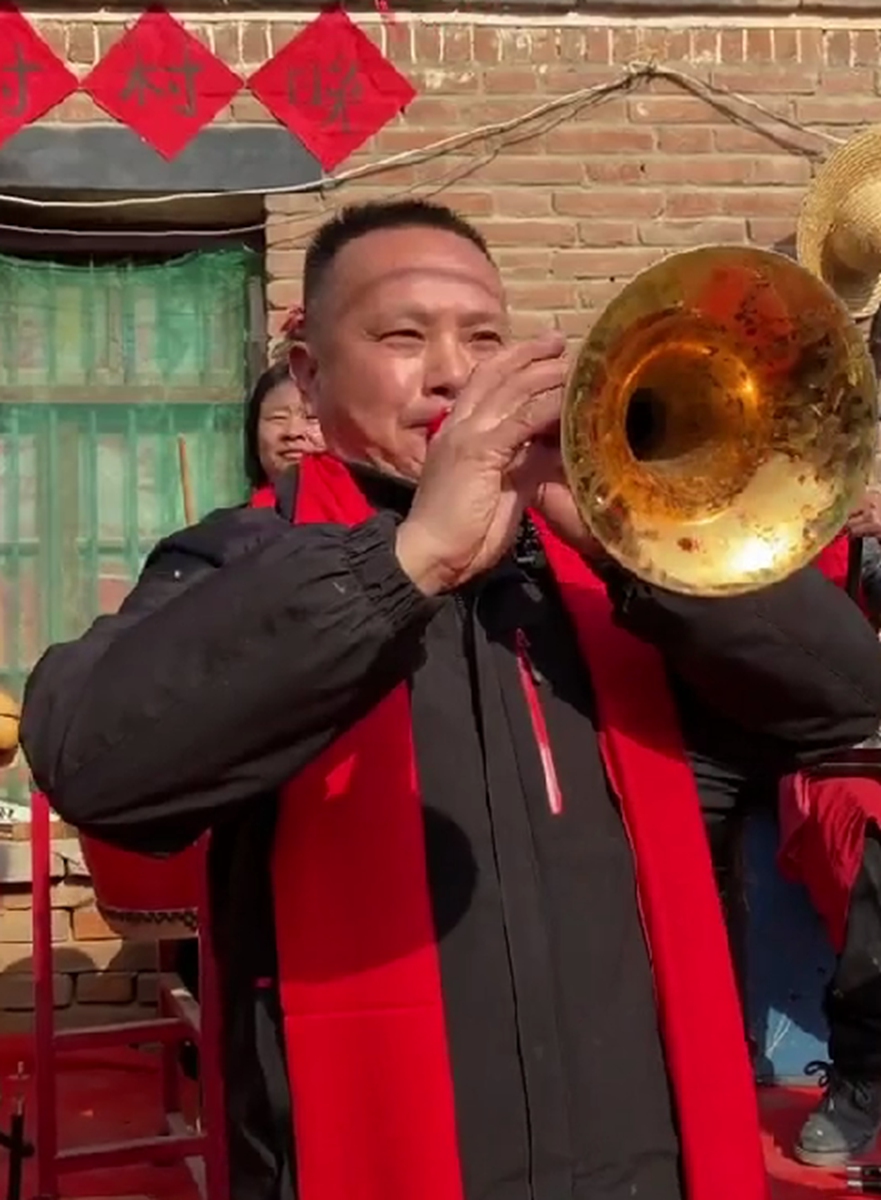ARTS / CULTURE & LEISURE
Veteran folk artist keeps traditional Chinese instrument suona alive despite setbacks
Undying passion

People play suona. Photo: VCG
For Ma Chunfeng, a 48-year-old folk artist living in the "suona village" of Mazhuang, traditional Chinese music is an all-consuming passion.Suona, a double-reeded instrument seen as the "king" of all instruments, was introduced to China thousands of years ago. Mazhuang is a well-known suona village in Central China's Henan Province, where the instrument has been played for more than 400 years. Almost everyone in the village can play the instrument, with the oldest player more than 80 years old and the youngest only 8.
With the development and changes of the times, there are fewer people listening to or playing suona. This has not been true for Ma, though. He always has suona on his mind. In recent years, he has even begun streaming performances on short video platforms, such as Douyin.
In the beginning, he had a hard time to get musicians together because of lack of equipment. But he insisted on livestreaming, and eventually even organized a "Suona Village Night" that attracted 380,000 viewers on Douyin.

Ma Chunfeng plays suona. Photo: Courtesy of Ma Chunfeng
Love and obsessionMeanwhile, "suona is also seen as an unlucky instrument. People have the impression that suona is something that is only blown when someone dies in the village," Ma said.
Although he was questioned and even ridiculed by others at the time, Ma could not let go of his love for the instrument in his heart.
Ma began learning to play suona when he was about 8 or 9 years old.
"Our family have been suona players for generations," Ma said.
He recalls practicing the traditional instrument as a child, leading cattle to the river and practicing while herding them. For him, the instrument is connected to his most beautiful childhood memories.
"Every time I got tired of playing, I would lie down on the grass, and it felt so good," he said.
Making his music dreams comes true hasn't been easy.
"I used to be unable to support my family by playing suona," he said.
Ma ran a barber shop and also drove a tricycle around to sell products such as watermelons, energy-saving light bulbs or peppers at the market to support his family.
When selling fruit, people would sometimes ask him to perform. He never hesitated to stop selling fruit and gather friends to play together.
At the time, selling fruit was profitable. But even if he could make 300 yuan ($42) a day from selling fruit and only 200 yuan from performing, he was still willing to perform and play suona if given the choice.
"Suona has always had a place in my heart and I just can't get it out of my head. No matter the money I make from a performance, I'm still willing to play it," Ma told the Global Times.
"Playing suona has become a part of my life, and when I see someone playing it, I will stop and watch and listen for a while."
A new path
Playing suona is not only a fun part of the villagers' lives, it is an inseparable part of their livelihoods. Almost 80 percent of the people in the village depend on the instrument in one way or the other. Each family has a year-round guarantee of more than 100 paid performances.
This was, however, deeply impacted by the COVID-19 pandemic, when it would be lucky for a family to find a dozen shows a year.
"In the past, shows were usually booked at least a year in advance, but now there are fewer and fewer demands for shows," Ma noted.
Villagers have turned to other traditional means to make a living, and fewer young people are playing suona.
The question of how to support his family and pass on his ancestral suona skills has been a struggle for Ma over the past few years.
It was at this point that his son proposed performing online and shooting short videos. Using this method, Ma only needed a smart phone to allow suona to break out of its traditional circles. "When I saw about 20,000 to 30,000 people watch my livestreams, I became quite excited," Ma said.
As his channel has gained more and more fans, a lot of villagers have become willing to pick up their instruments again and perform in front of Ma's camera.
This success has greatly inspired Ma, who now streams every day. The audience's response has turned from joking about the instrument to a love for the instrument, which has also made him feel happy.
"Playing suona can be lively and make everyone happy," Ma said.
Ma came up with another creative idea, holding a village night online. So he brought back his friends who played suona for a large scale performance. That day, the small courtyard performance brought in 380,000 online viewers.
Looking back on his life, Ma is happy that he has stuck with the instrument. He recently took on a 9-year-old apprentice to pass on his skills.
Ma told the Global Times that he also wants to organize cultural exchanges so that more people around the world can understand and appreciate suona.



